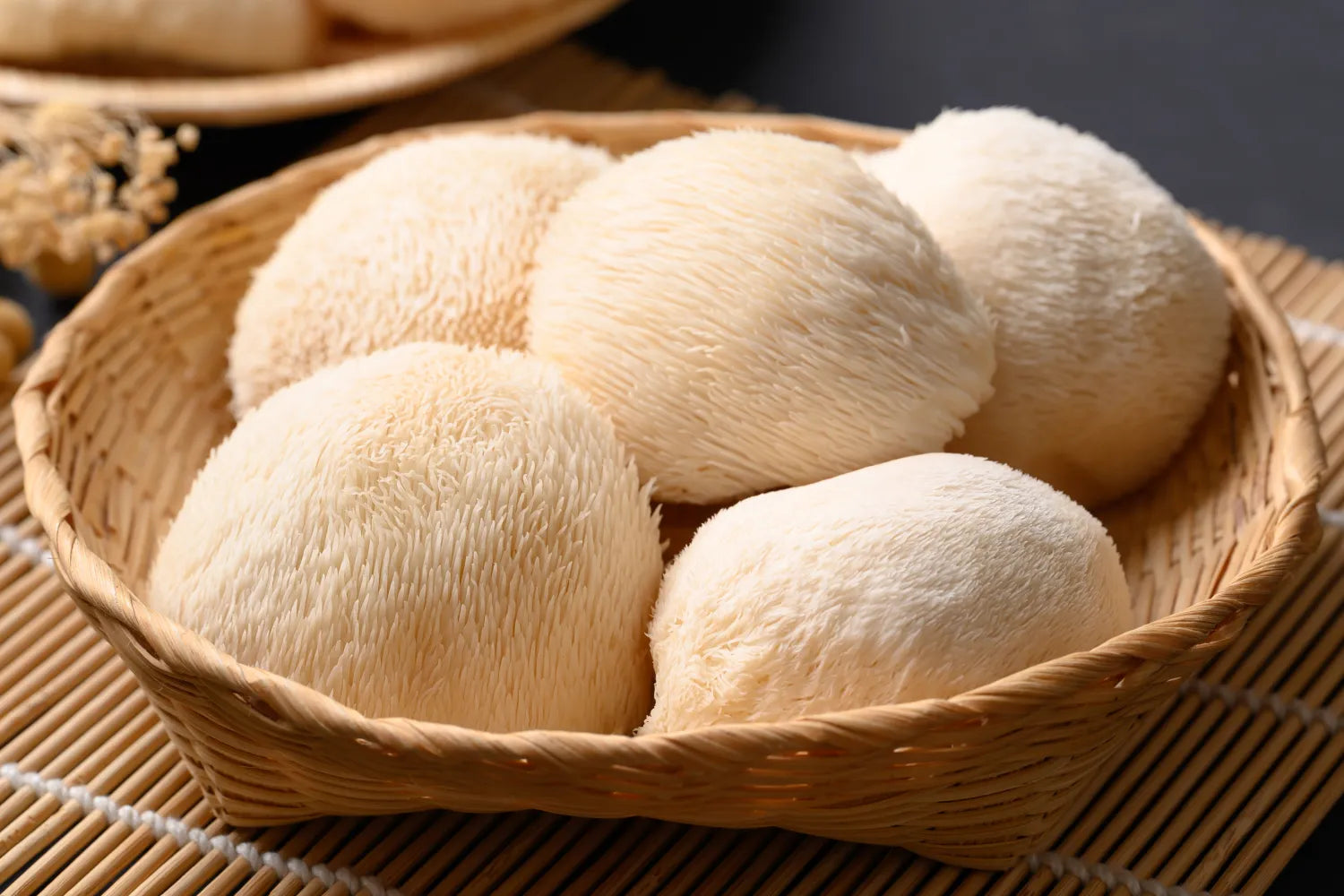5 Benefits of the Lion's Mane Mushroom, Per Research

There have been many supplement fads over the years, with even more rolling in thanks to health influencers on Instagram and TikTok. You might even remember a few: Sea moss, goldenseal, and pomegranate juice have all had their moments in the spotlight.
Lion’s mane mushroom is another ingredient that is currently building up a huge following. With all the hype, it’s only natural to wonder whether there’s any truth to the fad.
While not all supplements provide the miracle benefits promised on social media, some (like lion’s mane) do actually stand the test of scientific scrutiny. So grab a cup of mushroom coffee (we know a good one), and let’s dive into what this mushroom can actually do for your mind and body.
What Is Lion’s Mane Mushroom?
Lion’s mane (Hericium erinaceus) is a fluffy, white mushroom that kind of looks like a beard or a — you guess it — lion’s mane. It’s long been used in traditional Chinese and Japanese medicine, but now it’s stealing the supplement show in the West.
Why? It contains special compounds (hericenones, erinacines, and beta-glucans) that can have all kinds of protective benefits throughout your body. It’s also packed with antioxidants and even small amounts of B vitamins.
5 Science-Backed Benefits of Lion’s Mane
So, what exactly do these compounds do, and why are we such firm believers in this shaggy mushroom? Here’s what it can do for you.
1. Supports Brain Growth
Let’s talk about nerve growth factor (NGF). NGF helps your neurons repair themselves, grow new branches, and make those “aha!” moments more likely. Lion’s mane contains compounds like erinacines that cross the blood-brain barrier (which is a big deal!) and can support the production of NGF.
In lab studies, researchers saw lion’s mane promoting the regeneration of damaged nerves, especially in the brain and spinal cord. While most of this research is in animals or test tubes, it lays exciting groundwork for helping people with neurological issues, or just anyone who wants to keep their mental edge sharp.
2. Encourages Clear Thinking and Memory
Several studies have looked at lion’s mane for its ability to encourage memory, focus, and mental clarity. In one 16-week study of older adults with mild cognitive impairment, those who took 3 grams of lion’s mane daily showed significant improvements in cognitive function compared to the placebo group.
Another study in adults with early Alzheimer’s symptoms found that just one gram of lion’s mane per day improved their mental scores over 49 weeks. Even healthy young adults taking lion’s mane daily have reported quicker mental reaction times and lower stress levels.
But what does this mean for you? Basically, lion’s mane can support long-term brain health, and it might also help you crush your next to-do list or remember where you left your keys.
3. Supports a Balanced Mood
Lion’s mane can also have some surprising calming benefits. In both animal and human studies, lion’s mane has shown the ability to ease feelings of anxiety and depression, likely by soothing irritation in the brain and supporting the regeneration of neurons in mood-related brain regions.
One human study involving menopausal women found that participants who ate lion’s mane cookies daily for a month experienced significantly reduced feelings of anxiety and irritability.
For younger adults, daily doses of around 1.8 grams minimized perceived stress and anxiety in just a few weeks. Even better, lion’s mane can do all of this without causing you to be tired and groggy all the time. It’s kind of a win-win!
4. Encourages a Balanced Gut Microbiome
Your gut is basically the control center for your immune system, mood, and energy. And as if lion’s mane wasn’t already a super supplement thanks to its brain-supporting abilities, it can also help encourage a healthy gut.
Research shows that lion’s mane helps protect the stomach lining, soothes gastric irritation, and even suppresses harmful bacteria like H. pylori, which is associated with ulcers. In animal models, it supported recovery from intestinal damage and encouraged the gut’s ability to absorb nutrients.
One small human pilot study using animals with digestive irritation found reduced symptoms in just a few weeks. Lion’s mane may also positively influence the microbiome (the community of bacteria in your gut), which can have effects on everything from mood and immunity to skin health and PMS.
5. Supports a Healthy Metabolism
Lion’s mane isn’t just working upstairs — it also pulls double (or is that triple?) duty when it comes to certain metabolic markers. Animal studies have shown that lion’s mane can help support healthy levels of LDL (aka “bad”) cholesterol and triglycerides, and it may even help with fat accumulation.
Some researchers believe the mushroom helps prevent oxidation of cholesterol, which is key to keeping your arteries clear and happy. There's also emerging evidence that it may support insulin sensitivity and healthy blood sugar regulation. These are big wins, whether you're looking to prevent metabolic dysfunction or just keep your energy more stable throughout the day.
Can You Eat Lion’s Mane? How To Take It
Yes, lion’s mane is 100% edible, and it’s also quite delicious. When cooked, it has a tender, meaty texture and a mild flavor often compared to crab or lobster. It’s great sautéed in butter, added to stir-fries, or tossed into soups.
But, while it's tasty on your plate, cooking doesn't unlock its therapeutic benefits the way extraction does. Those potent compounds like hericenones and erinacines need to be pulled out using hot water and alcohol, hence why supplements and functional drinks are where the real magic happens.
Here’s a little breakdown on the different forms of lion’s mane:
|
Form |
Pros |
Cons |
|
Powder |
Affordable; easy to mix into drinks/food |
Low bioavailability; messy; earthy taste |
|
Capsules |
Convenient; no prep needed |
Easy to forget; may have low extraction quality |
|
Tinctures |
Higher bioavailability; fast absorption |
Strong taste; pricier; may contain alcohol |
|
Mushroom Coffee+ |
Double-extracted for max bioavailability; delicious; easy to remember |
Pricier than powders; contains caffeine (a plus for some!) |
Personally, if we’re going to take a supplement every day, we want it to be delicious and easy to remember. That’s why we made our Mushroom Coffee+.
This blend is made with lion’s mane and chaga mushrooms, L-theanine for some extra brain and mood support, collagen for gut health, and coffee extract to provide the wake-up call we expect from a cup of coffee. When it’s all said and done, the end result is a smooth, robust cup of coffee that has more benefits than the nearby chain cafe could ever hope to boast.
Plus, there are so many ways to enjoy our Mushroom Coffee+. Here are some of our favorites:
- Mix it with hot water and enjoy plain
- Add in some steamed milk for a mushroom latte
- Blend into a smoothie for a morning pick-me-up
- Stir into overnight oats or chia seed pudding
- Add to pancake batter or waffles
- Mix with whipped cream for an adaptogenic dessert topper
- Bake into cookies or muffins
- Sprinkle into yogurt, nut butter, or protein balls
The Bottom Line
The results are in, and lion’s mane mushroom isn’t just another wellness fad. Its benefits extend far and wide, showing up in your brain, mood, gut, and heart.
Whether you’re sipping it in your Mushroom Coffee+ or whipping up lion’s mane pancakes on the weekend, the benefits are legit and the options are endless. Just remember: consistency is key. Check out the rest of our collection today to find a flavor that fits best with your routine.
Sources:
Neurohealth Properties of Hericium erinaceus Mycelia Enriched with Erinacines | PMC
Therapeutic Potential of Hericium erinaceus for Depressive Disorder | PMC
Reduction of depression and anxiety by 4 weeks Hericium erinaceus intake | PubMed
Start your day
The Right Way









